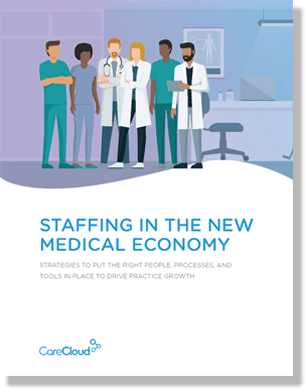There’s a growing revolution in the healthcare industry that is changing the way providers and patients communicate, collaborate and interact.
Cloud computing is a transformative innovation in healthcare IT and has become a popular tool for practice management.
Cloud computing presents a multitude of benefits to most users, but some practice managers may be wary of abandoning a legacy practice management system. If you’re considering moving to a cloud-based system, ask yourself the following questions and see if they lead you toward the cloud.
Do you have access to a viable Internet connection?
Since there’s no need to purchase physical equipment, all you need to access a cloud-based system is the ability to get online. If you can check email, you can visit the cloud.
Your access, though, will only be as strong as your bandwidth. If you’re practicing in a rural area with limited connectivity or endure slow Internet speeds for any other reason, you’ll want to upgrade to a broadband or T1 commercial connection before selecting a cloud service provider.
If concerns about losing Internet access during an outage or natural disaster are plaguing your decision to switch to the cloud, purchase an inexpensive backup solution like 4G to use in case of emergency.
Are you looking to lower your overhead expenses?
A survey from CDW found that 88% of the healthcare organizations utilizing cloud computing reduced their IT costs. The average savings of 20% results from cutting IT personnel expenses and eliminating expensive server hardware purchases.
Cloud software systems charge regular, consistent fees that can be incorporated into a practice’s monthly budget. Tech support from your vendor should come included in the charges, and no up-front hardware purchases are necessary.
How much downtime are you losing?
If you’re working with server software, you’re probably accustomed to notification windows frequently popping up on your screen, prompting you to download upgrades.
If you’re not overly busy, the downtime required to update your software and restart your PC may not be a pressing issue. If you’re swamped, the hassle of repeatedly clicking “ignore” and shutting down for upgrades may be stalling your workflow.
Cloud-based system upgrades are executed automatically during off hours, so they spare you from losing so much time.
Are you lagging behind in your HIPAA 5010 & ICD-10 conversion efforts?
Cloud-based practice management systems are more likely than legacy systems to ease the impact of your transition.
Since they’re newer, cloud softwares were designed with conversion deadlines in mind. As such, their upgrades to Version 5010 and ICD-10 transmission capabilities will occur seamlessly and automatically.
Buying and deploying a cloud-based system now ensures your use of compliant software come January 1, 2012 and October 1, 2013, respectively.
When your technology solution is secured, you can focus your efforts on training staff for the format changes instead of waiting for your legacy vendor to deploy a clunky last-minute upgrade.
Is your data secure?
Were your practice to be burglarized or hit by a natural disaster, would your data be easily recoverable? Since they house data in physical hardware, server-based systems are vulnerable to theft or destruction.
Cloud-based systems store data online. If your office’s computers, tablets, mobile devices or other systems are stolen or otherwise jeopardized, you’ll still be able to access your password-protected data from another device. Cloud systems also guard you from a security breach by automatically encrypting all data upon receipt.
So… are you ready?
For years, cloud computing was viewed by the medical industry as new, unproven technology. Today, though, perceptions have shifted to see it as the refined, comprehensive solution it truly is.
“The primary concerns surrounding cloud computing in healthcare have always been data security and performance,” says Cristine Kao, Carestream Health’s global HICS marketing manager. “The technology infrastructure is now in place to provide reliable, secure, and high-performance computing via the cloud.”
Cloud computing has proven itself to be a successful tool for many different uses and businesses. Is it a reliable, efficient solution for practice management? Yes… no question.
How has using a cloud-based practice management system improved processes at your office?
Madelyn Young is a Content Writer for CareCloud and an expert on practice management, medical billing, HIPAA 5010, ICD-10 and revenue cycle management. You can read her work on Power Your Practice and the CareCloud Blog. Contact Madelyn with story suggestions, contributor articles, or any other feedback at madelyn@poweryourpractice.com or follow her on Twitter @madelyn_young.
The material and information contained on this website is for general information purposes only. You should not solely rely upon the material or information on the website as a basis for making any business, legal, medical, or any other decisions. While we endeavor to keep all information up-to-date and correct, all information in this site is provided "as is," and CareCloud Corporation and MTBC Inc. make no representations or warranties of any kind, express or implied, about the completeness, accuracy, reliability, suitability, or availability with respect to the information contained on the website for any purpose. Any reliance you place on such material is therefore strictly at your own risk.



